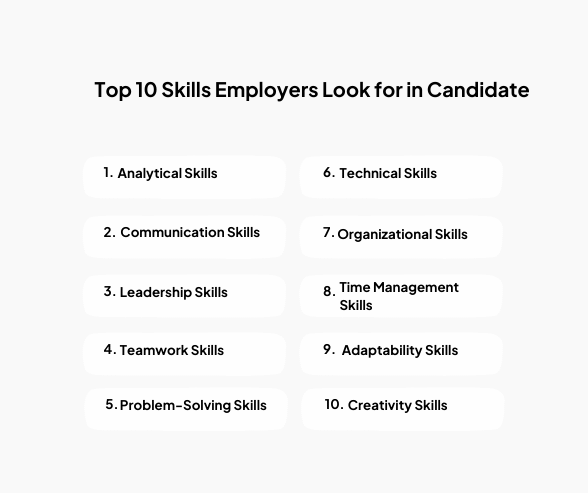Your resume serves as your first impression on potential employers. Beyond listing your work experience and education, highlighting the right skills can significantly boost your chances of landing an interview. Mastering the art of skills to include on a resume is important.
Types of Skills for Resume
Hard Skills
Hard skills are specific, learnable abilities that can be quantified and measured. These skills are typically gained through education, training programs, or certifications. Hard skills include proficiency in programming languages, data analysis, graphic design, and accounting software.
Example: A software engineer might include hard skills such as proficiency in Python, knowledge of cloud computing platforms like AWS, and experience with agile development methodologies on their resume.
Soft Skills
On the other hand, soft skills are interpersonal or people skills that are more difficult to quantify. These skills are often inherent or developed through experience and practice. Soft skills include communication, teamwork, leadership, adaptability, and problem-solving.
Example: A marketing manager might emphasize soft skills such as effective communication, leadership abilities to lead a team, and adaptability to changing market trends on their resume.
Top 10 Skills Employers Look for in Candidate

Analytical Skills
Analytical skills involved in collecting and interpreting data to make informed decisions. Employers value candidates who can analyze complex information and draw meaningful conclusions. A financial analyst might highlight their ability to perform financial modeling and data analysis using Excel and statistical software.
Communication Skills
Effective communication is crucial in every industry. Employers seek candidates who can convey ideas clearly and concisely, whether through written reports, presentations, or interpersonal interactions. A sales representative might showcase their communication skills by highlighting their ability to build rapport with clients and deliver persuasive sales pitches.
Leadership Skills
Leadership skills demonstrate your ability to guide and motivate others toward achieving common goals. Employers value candidates who can lead teams, delegate tasks effectively, and inspire trust and respect. An operations manager might highlight their leadership skills by showcasing successful team projects and initiatives that led to increased productivity and efficiency.
Teamwork Skills
Teamwork skills are essential for collaborating effectively with colleagues to achieve shared objectives. Employers look for candidates who can contribute positively to team dynamics, resolve conflicts, and foster a supportive work environment.
A project manager might emphasize their teamwork skills by showcasing their experience in leading cross-functional teams to deliver projects on time and within budget.
Problem-Solving Skills
Problem-solving skills involve identifying challenges, analyzing root causes, and implementing effective solutions. Employers seek candidates who can think critically, adapt to unexpected situations, and propose innovative ideas.
For example: a customer support specialist might highlight their problem-solving skills by showcasing their ability to resolve complex customer issues efficiently and improve customer satisfaction metrics.
Technical Skills
Technical skills refer to specialized knowledge and expertise required for specific roles or industries. Employers often seek candidates who possess technical skills relevant to their field, such as software proficiency, coding languages, and industry-specific tools. A cybersecurity analyst might list technical skills such as knowledge of network security protocols, penetration testing, and malware analysis on their resume.
Organizational Skills
Organizational skills involve the ability to manage time, prioritize tasks, and maintain attention to detail. Employers value candidates who can stay organized and meet deadlines consistently. An administrative assistant might highlight their organizational skills by showcasing their ability to manage calendars, coordinate meetings, and streamline office operations.
Time Management Skills
Time management skills are crucial for maximizing productivity and achieving goals within specified timeframes. Employers seek candidates who can effectively prioritize tasks, minimize procrastination, and maintain focus under pressure.
Example: A project coordinator might emphasize their time management skills by showcasing their ability to create project timelines, allocate resources efficiently, and meet project milestones.
Adaptability Skills
Adaptability involves the ability to adjust to new circumstances, challenges, or environments. Employers value candidates who can embrace change, learn new skills quickly, and thrive in dynamic work environments. A marketing strategist might highlight their adaptability skills by showcasing their ability to pivot strategies based on market trends, consumer behavior, and competitive analysis.
Creativity Skills
Creativity is the ability to think outside the box, generate new ideas, and approach problems from innovative perspectives. Employers seek candidates who can bring fresh insights and solutions to their organizations. A Graphic designer might showcase their creativity by highlighting their portfolio of visually appealing and conceptually strong designs that have positively impacted client campaigns.
How to List Skills on Your Resume
When listing skills on your resume, follow these best practices to effectively showcase your qualifications:
Choosing the Right Skills
Tailor your skills to match the job description and highlight those most relevant to the position you’re applying for. For example, if you’re applying for a data analyst role, emphasize skills such as data visualization, and statistical analysis, and proficiency in analytical tools like Tableau.
Formatting and Placement
Include a dedicated skills section on your resume to prominently display your qualifications. You can categorize skills into sections such as technical skills, soft skills, and industry-specific skills to make them easy for recruiters to identify. For example, organize technical skills under subheadings like Programming Languages and Software Proficiency to showcase your technical expertise effectively.
Conclusion
In conclusion, mastering the art of including the skills on a resume can significantly enhance your job prospects and set you apart from other applicants.
You demonstrate your readiness to contribute effectively in any role. Do not forget that your resume serves as a gateway to showcase not just what you’ve done, but what you can bring to a prospective employer. Tailoring your skills to align with the job description and presenting them clearly and strategically will undoubtedly increase your chances of landing that coveted interview.
As you continue to develop and refine your skills, you’re not just building a resume, you’re building a foundation for a successful career journey ahead.
